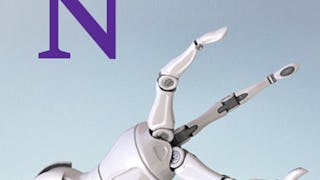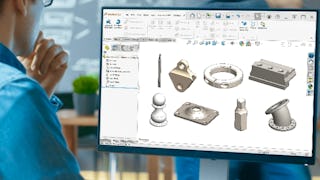- Browse
- Cnc
CNC Courses
CNC courses can help you learn programming techniques, machine operation, design principles, and precision measurement. You can build skills in interpreting technical drawings, setting up CNC machines, and troubleshooting common issues. Many courses introduce tools like CAD software for designing parts, CAM software for generating tool paths, and various CNC machines such as routers and lathes, showing how these skills are applied in real-world manufacturing and fabrication projects.
Popular CNC Courses and Certifications
 N
NNational Taiwan University
Skills you'll gain: 3D Modeling, SketchUp (3D Modeling Software), Software Installation, Visualization (Computer Graphics)
4.6·Rating, 4.6 out of 5 stars671 reviewsBeginner · Course · 1 - 3 Months
 Status: Free TrialFree TrialN
Status: Free TrialFree TrialNNorthwestern University
Skills you'll gain: Robotics, Machine Controls, Control Systems, Automation Engineering, Mathematical Modeling, Mathematical Software, Simulation and Simulation Software, Engineering Calculations, Engineering, Mechanics, Mechanical Engineering, Artificial Intelligence, Vibrations, Applied Mathematics, Engineering Analysis, Automation, Virtual Environment, Torque (Physics), Graph Theory, Matlab
4.7·Rating, 4.7 out of 5 stars1.2K reviewsIntermediate · Specialization · 3 - 6 Months
 Status: Free TrialFree TrialU
Status: Free TrialFree TrialUUniversity at Buffalo
Skills you'll gain: Model Based Systems Engineering, Peer Review, Programmable Logic Controllers, Systems Engineering, Product Lifecycle Management, Intrusion Detection and Prevention, Security Controls, Performance Measurement, Collaborative Software, Control Systems, Continuous Monitoring, Anomaly Detection, Machine Controls, Incident Response, Digital Transformation, Vulnerability Assessments, Software Development Life Cycle, Production Process, Cybersecurity, Manufacturing Operations
4.6·Rating, 4.6 out of 5 stars7K reviewsBeginner · Specialization · 3 - 6 Months
 Status: NewNewStatus: Free TrialFree Trial
Status: NewNewStatus: Free TrialFree TrialSkills you'll gain: Programmable Logic Controllers, Animations, Human Machine Interfaces, Control Systems, Real-Time Operating Systems, Visualization (Computer Graphics), Control Panels, Test Tools, Interactive Design, Automation Engineering, Program Development, Automation, Simulations, System Monitoring, Electrical Wiring, Computational Logic, Simulation and Simulation Software, User Interface (UI) Design, Network Troubleshooting, User Feedback
Intermediate · Specialization · 3 - 6 Months
 Status: Free TrialFree TrialL
Status: Free TrialFree TrialLL&T EduTech
Skills you'll gain: Robotics, Programmable Logic Controllers, Control Systems, Automation, Simulation and Simulation Software, Manufacturing Processes, Human Machine Interfaces, Industrial Engineering, Internet Of Things, Matlab, Process Control
4.4·Rating, 4.4 out of 5 stars106 reviewsIntermediate · Course · 1 - 4 Weeks
 Status: Free TrialFree TrialD
Status: Free TrialFree TrialDDassault Systèmes
Skills you'll gain: SolidWorks (CAD), 3D Modeling, Computer-Aided Design, Mechanical Design, Technical Design
5·Rating, 5 out of 5 stars24 reviewsBeginner · Course · 1 - 4 Weeks
What brings you to Coursera today?
 Status: Free TrialFree TrialU
Status: Free TrialFree TrialUUniversity at Buffalo
Skills you'll gain: Digital Transformation, Manufacturing Processes, Manufacturing Operations, Automation Engineering, Industrial Engineering, Business Transformation, Production Process, Digital Design, Supply Chain Management, Data-Driven Decision-Making, Market Dynamics, Workforce Development, Cybersecurity
4.7·Rating, 4.7 out of 5 stars3.6K reviewsBeginner · Course · 1 - 4 Weeks
 Status: NewNewStatus: Free TrialFree Trial
Status: NewNewStatus: Free TrialFree TrialSkills you'll gain: AutoCAD, Architectural Drawing, Technical Drawing, Drafting and Engineering Design, Architectural Design, Civil and Architectural Engineering, Building Design, Building Codes, Safety Standards, Construction
Beginner · Course · 1 - 4 Weeks
 Status: NewNewStatus: Free TrialFree TrialD
Status: NewNewStatus: Free TrialFree TrialDDassault Systèmes
Skills you'll gain: Mechanical Design, Computer-Aided Design, 3D Modeling, Assembly Drawing, Engineering Drawings, Mechanical Engineering, Product Engineering, Technical Drawing, Engineering Design Process, Product Development, Manufacturing and Production
Beginner · Course · 1 - 4 Weeks
 Status: NewNewStatus: PreviewPreviewS
Status: NewNewStatus: PreviewPreviewSSiemens
Skills you'll gain: Safety Standards, Robotics, Electrical Safety, Mechanical Design, Automation, Control Systems, Manufacturing and Production, Performance Testing, Human Machine Interfaces, Computer Programming, Programming Principles
4.7·Rating, 4.7 out of 5 stars18 reviewsBeginner · Course · 1 - 4 Weeks
 Status: Free TrialFree TrialU
Status: Free TrialFree TrialUUniversity of Colorado Boulder
Skills you'll gain: Machine Controls, Control Systems, Basic Electrical Systems, Electrical Systems, Power Electronics, Three-Phase, Torque (Physics), Electrical Equipment, Embedded Software, Electronics, Electrical Wiring, Design Specifications, System Requirements, Laboratory Experience, Electronic Components
Build toward a degree
4.7·Rating, 4.7 out of 5 stars1.4K reviewsIntermediate · Course · 1 - 3 Months
 Status: NewNewStatus: Free TrialFree Trial
Status: NewNewStatus: Free TrialFree TrialSkills you'll gain: Product Lifecycle Management, Conceptual Design, Sustainable Design, Project Planning, Sustainable Engineering, Product Development, Systems Engineering, Product Management, Product Design, Manufacturing and Production, Design and Product, Risk Management, Design Software, Engineering, Time Management, Internet Of Things, Cross-Functional Collaboration, Artificial Intelligence and Machine Learning (AI/ML), Artificial Intelligence, Communication
4.8·Rating, 4.8 out of 5 stars6 reviewsBeginner · Course · 1 - 3 Months
In summary, here are 10 of our most popular cnc courses
- 3D CAD Fundamental: National Taiwan University
- Modern Robotics: Mechanics, Planning, and Control: Northwestern University
- Digital Manufacturing & Design Technology: University at Buffalo
- Learn PLC and HMI from Scratch (Basic): Packt
- Fundamentals of Robotics & Industrial Automation: L&T EduTech
- SOLIDWORKS Revolution and Cut Features: Dassault Systèmes
- Digital Manufacturing & Design: University at Buffalo
- Master AutoCAD Corporate Layouts: Design & Drafting Skills: EDUCBA
- Explore the Mechanical Designer Role: Dassault Systèmes
- Basics of Robotics: Siemens
Frequently Asked Questions about Cnc
CNC, or Computer Numerical Control, is a technology that automates the control of machining tools through computer programming. It is crucial in modern manufacturing as it enhances precision, efficiency, and repeatability in producing complex parts. CNC machines are widely used in various industries, including aerospace, automotive, and electronics, making it an essential skill for those looking to enter the manufacturing sector.
With skills in CNC, you can pursue various job roles, including CNC operator, CNC programmer, and CNC machinist. These positions are vital in manufacturing settings where precision and efficiency are paramount. Additionally, roles such as quality control inspector and production supervisor may also be available to those with CNC expertise, offering a pathway to career advancement.
To succeed in CNC, you should learn technical skills such as reading blueprints, programming CNC machines, and understanding machining processes. Familiarity with CAD (Computer-Aided Design) software is also beneficial, as it helps in designing parts for CNC machining. Soft skills like problem-solving, attention to detail, and effective communication are equally important in this field.
Some of the best online CNC courses focus on practical skills and real-world applications. Look for programs that cover CNC programming, machine operation, and CAD software. While specific courses may vary, platforms like Coursera offer a range of options that can help you build a solid foundation in CNC technology.
Yes. You can start learning CNC on Coursera for free in two ways:
- Preview the first module of many CNC courses at no cost. This includes video lessons, readings, graded assignments, and Coursera Coach (where available).
- Start a 7-day free trial for Specializations or Coursera Plus. This gives you full access to all course content across eligible programs within the timeframe of your trial.
If you want to keep learning, earn a certificate in CNC, or unlock full course access after the preview or trial, you can upgrade or apply for financial aid.
To learn CNC, start by exploring online courses that provide a structured curriculum. Engage in hands-on practice with CNC machines if possible, as practical experience is invaluable. Additionally, consider joining forums or communities where you can ask questions and share insights with others in the field.
For training and upskilling employees in CNC, look for courses that emphasize hands-on learning and real-world applications. Programs that offer certifications or professional certificates can also be beneficial, as they validate skills and knowledge in the workplace. Consider options that include both theoretical and practical components to ensure a well-rounded training experience.










